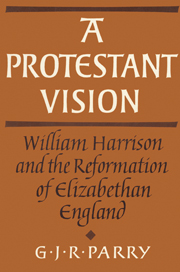5 - A reformed Prince
Published online by Cambridge University Press: 20 October 2009
Summary
The preceding chapter concluded by drawing an important contrast between the assumptions which Harrison shared with other Elizabethan Protestants, and Richard Hooker's statements about the source of saving knowledge. Hooker's argument rested on scholastic notions about the law of nature, those fundamental principles of God's law imprinted in all human hearts, and which human reason might perceive at all times. Natural law theories also underpinned both Protestant and Catholic political debate in this period, but although we now turn to consider Harrison's political outlook and what it reflects about Protestant political theories in general, this chapter will suggest that Harrison largely disregarded the law of nature in seeking inspiration and justification for his interpretation of contemporary political institutions.
It further argues that for other Protestants, at least as far as they addressed themselves to other members of the True Church, the Scriptural account of the fortunes of the Elect under God's providential direction provided a source of truth superior to the law of nature. The law of nature appears subordinate to revelation when put into the general context of sixteenth-century Protestant thought, and particularly in the context of radical Calvinist thought about the covenant and its implications for contemporary political obligations. Modern historians have quite rightly stressed the indebtedness of Calvinist political theorists such as John Ponet, Christopher Goodman and Theodore Beza to scholastic, conciliarist and Roman Law political theories, which all seemed ultimately to deduce their principles from the law of nature.
- Type
- Chapter
- Information
- A Protestant VisionWilliam Harrison and the Reformation of Elizabethan England, pp. 199 - 243Publisher: Cambridge University PressPrint publication year: 1987

